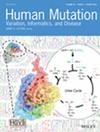Current estimates suggest that up to 10% of patients with myeloid neoplasms (MN) harbor variants associated with a germline predisposition. A pathogenic variant in the runt-related transcription factor 1 gene (RUNX1) is a frequent cause of germline predisposition to MN. RUNX1 variants detected in tumor tissue at a VAF close to 50% are potentially germline and causative of RUNX1 familial platelet disorder with associated myeloid malignancies. Previous studies have found germline RUNX1 variants in 3% of patients with acute myeloid leukemia; however, the frequency of germline RUNX1 variants in less advanced myeloid neoplasms has not been examined. We screened 590 patients suspected of MN, excluding myeloproliferative neoplasms, for germline variants in RUNX1. We found RUNX1 variants in 83 patients (14%) by targeted sequencing of tumor tissue. In 40 patients (6.8%), the VAF of RUNX1 was above 30%. In 32 of the 40 patients, skin biopsies were available and used for Sanger sequencing to assess the germline status. Two of the tested variants (6.3%) were confirmed as germline, and both variants were curated as variants of unknown significance. To further explore the pathogenicity of these variants, we implemented a novel CRISPR-Select functional genetic assay. The assay demonstrated a profound effect on proliferation in K562 cells for a known pathogenic variant but no effect for the two germline variants detected in the study. We therefore propose that both germline variants are classified as likely benign. In this study, we show that RUNX1 germline variants are rare in Danish patients with MN and use a novel assay for functional classification of germline RUNX1 variants.



